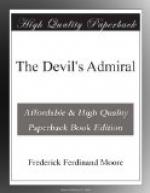CHAPTER
I. Missionary and Red-Headed Beggar
II. Red-Headed Beggar and Missionary
III. The Spy and the Dead Boatswain
IV. I Go Aboard the Kut Sang
V. The Dead Man in the Passage
VI. The Red-Headed Man Makes an Accusation
VII. I Turn Spy Myself
VIII. Mr. Harris Has a Few Ideas
IX. A Fight in the Dark
X. The Devil’s Admiral
XI. A Council of War
XII. The Battle on the Bridge
XIII. We Plan an Expedition
XIV. The Pursuit Ashore
XV. Two Thieves and a Fight
XVI. The Gold and the Pirates
XVII. The Art of Thirkle
XVIII. Big Stakes in a Big Game
XIX. “One Man Less in the Forecastle
Mess”
XX. The Last
CHAPTER I
MISSIONARY AND RED-HEADED BEGGAR
Captain Riggs had a trunk full of old logbooks, and he said any of them would make a better story than the Kut Sang. The truth of it was, he didn’t want me to write this story. There were things he didn’t wish to see in type, perhaps because he feared to read about himself and what had happened in the old steamer in the China Sea.
“Folks don’t care nothing about cargo-boats,” he would say, taking his pipe out of his mouth and shaking his head gravely, whenever I hinted that I would like to tell of our adventure of the Kut Sang. “They want yarns of them floating hotels called liners, with palm-gardens in ’em and bands playing at their meals and games and so on going from eight bells to the bos’n’s watch.
“It was mostly fighting in the Kut Sang, and the mess you and me and poor Harris and the black boy there got into wouldn’t be just the quiet sort of reading folks want these days. It was all over in a night and a day, anyway—look at them Northern Spy apples, Mr. Trenholm!”
He wanted to forget the Kut Sang and the awful night we had in her. He imagined he didn’t figure to advantage in the story, and he winced when I mentioned certain events, although I always insisted that he was the bravest man among us, having a better realization of the odds against us. Those who have faced danger know it takes a brave man to admit that he is beaten, and still keep up the fight.
We all have better memories for our brave moments than for the fear which threatened for a time to prove us cowards. The man who has faced death and says he was not afraid is either a fool or a liar; and, if only a liar, still a fool for telling himself that which he knows to be a lie. The bravery of the seaman is that he fears the sea and knows its ruthlessness and its ultimate victory, and accepts it as a part of his day’s work. This is a sea-story.




